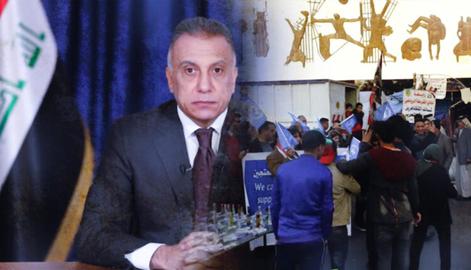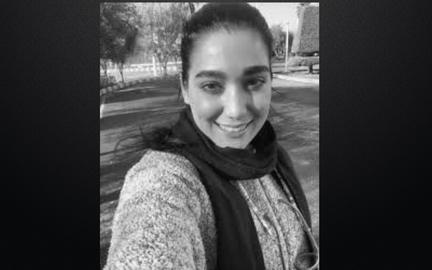The new Iraqi Prime Minister Mustafa Al-Kazimi faces the enormous task of trying to pull the country together both economically and politically amid domestic tensions and significant international pressure. If he does, the impact on Iraq and the region will be significant.
On May 6, after a long political struggle, the Iraqi parliament gave Al-Kazimi the go-ahead to form his government, though he is still being held back by a number of political disputes between influential parties and militias, including over ministerial quotas.
Al-Kazemi has strong relations across both the Iraqi and the international political spectrum, making him well placed to achieve a degree of political balance. According to Dr. Al-Sayyid Muhammad Ali Al-Husseini, Secretary-General of the Arab Islamic Council in Lebanon, Al-Kazimi is pragmatic and "knows how to be a friend to everyone; he is not hostile to anyone."
In the past, Al-Kazimi used his position as director of the Iraqi National Intelligence Service to "create ties with dozens of countries and agencies operating within the international coalition," Al-Husseini told IranWire. "These special characteristics could enable him to establish a balance with the contradictory players in Iraq."
External Balance
Al-Kazimi's relationships with external governments and leading figures set him apart from his predecessors. Sheikh Ali Hatim Suleiman, the Emir of Iraq’s Al-Dulaim tribes, says the relationship with the United States, which he described as “the true ruler of Iraq,” is particularly important, as is his relationship with Iran, which he dubs “the hidden player that has infiltrated the state and its institutions.” Suleiman also cites relations with neighboring countries including Saudi Arabia, Jordan, Turkey, and Kuwait as being key factors to Al-Kazimi’s potential success.
Baligh Abu Galal, of the political bureau of the Iraqi National Wisdom Movement coalition established in 2018, told IranWire that Al-Kazimi's work in intelligence and his diplomatic and strategic skills will make him a “cornerstone” in building "a bridge for communication and common interests” between countries with a history of hostility, such as Iran and the United States.”
But, while recognizing Al-Kazimi’s strengths, Sheikh Ali Hatim Suleiman told IranWire he seriously doubted that "Al-Kazimi or anyone else can reconcile two contradictory policies, as Iraq is the battleground between the United States and Iran.”
Suleiman added: "We wish him success, but the issue is greater than him, and it is not in his hands. The one leading Iraq in terms of politics, security, intelligence, and the security services is Iran." Suleiman said Iran was “clearly limiting his work" through the Popular Mobilization Commission's (PMC) militia.
"When the Americans impose something, they impose it immediately ... When Iran sees that the Americans want to impose something with force, it retreats, while at the same time the United States does not want to impose everything so that it pushes Iran into a tight corner, forcing Iran to sabotage everything.”
Al-Husseini pointed to a unique environment in which results could be achieved. "I think the decline and weakness Iran is currently suffering from in the region in general could constitute a golden opportunity that should be exploited to pull back sovereignty in Iraqi decisions.”
Ethnic-Sectarian Quotas
Iraq initiated political and sectarian quotas for ruling during the 2003 US invasion, and for 17 years, this has become a regular pattern for the way the country is governed. When Nuri Al-Maliki took over as Iraqi Prime Minister in 2006, serving until 2014, quotas were imbedded and established in all of Iraq's military, service, and security institutions.
These quotas together with Iran’s power in Iraq form Al-Kazimi’s greatest obstacles. Each military or political party is vying for various portfolios, making the process of setting up a cabinet very difficult. Suleiman says powerful Shia and Sunni groups, all heavily influenced by Iran, push for the quotas. But, he says, "the Americans do not care about quotas as long as they rule the whole of Iraq militarily.”
Al-Husseini again points to the weakening of Iranian influence, and its slight retreat within the region, which he says is also affected by its followers in Iraq being dispersed and divisions within the PMC militias. At the same time, Al-Husseini warned that "Iranian treachery and politics" were still in play and that "Tehran has the tools to turn the tables through its terrorist militias."
Baligh Abu Galal describes the political quotas and the distribution of ministerial roles across prominent political factions that do well in elections as "a mistake” and "a disease that threatens the political system,” while not having a huge impact on the government set up on these grounds.
Abu Galal suggests the situation could be solved by bringing “opposition and national ruling forces” into the political process. He notes that while Al-Kazimi has been unable to completely put an end to the quota system, he has "significantly reduced it” and “lessened its impact,” paving the way for it to be “completely bypassed in the future.”
Fadi Al-Shammari from the Iraqi National Wisdom Movement agrees. He told IranWire that the current government had been "formed by an independent majority with a hybrid of specialist ministers.” According to him, they are all qualified people, but the allocation of roles was “accepted in order not to disrupt the process.”
Corruption Cases
While Iran tries to impose particular ministers to push its own agenda in the Ministry of Electricity and the Ministry of Agriculture, disputes continue over other ministries, most notably with regard to the "oil issue,” a situation that has caused fierce conflict between representatives and politicians in the Al-Basrah Governorate. Al-Kazimi promised to appoint a minister from the governorate since it is the biggest producer of oil. At the same time, Kurdish parties insist that the previous government's finance minister, Fuad Hussein, be given the foreign affairs portfolio but non-Kurdish political forces have rejected this.
"Political parties – which have not been named — paid $60 million to buy the oil minister position,” member of parliament Muzaffar Al-Fadl told local media. In response, the MP for the Al-Basrah Governorate, Muzahim Al-Tamimi, called for Al-Fadl to be prosecuted and for the prime minister to take "disciplinary" measures against him.
Abu Galal says Al-Kazimi has “the final word” but that he "must side with national interests” by ensuring whoever he puts in the job has no links to corruption and i “not subject to political whims." The new foreign minister will need to “neutralize” Iraq and engage openly with countries that can help such a process, steering it away from conflict.
Fadi Al-Shammari, another senior Wisdom Movement coalition member, said differences could be resolved “within days.”
But Suleiman warned that corruption is rife in every ministry, so political parties and militias are unlikely to let Al-Kazimi or anybody else make cabinet decisions without their involvement. "Even if they allowed him to choose ministers, they will try to manipulate the positions" and "try to control the ministry from within. These are the parties' stakes and games."
But Abu Galal remained optimistic that Al-Kazimi could resolve the matter given his “personal characteristics and all the parties' confidence in him.”
Will Al-Kazimi Succeed?
Al-Husseini said when parliamentary elections take place, they "will reflect the great change that has come about in the popular mood, which might see the fall or the decline of the militia forces responsible for killing and suppressing demonstrators, while limiting Iranian influence.”
Sheikh Ali Hatim Suleiman is optimistic that the political process can be rebuilt “from an Iraqi perspective” and urged Al-Kazimi to seek "real cooperation from the United States and the international community to impose a strong international will on Iraq to silence and curb Islamic militias.” But he said Iran’s power should not be under-estimated. "Al-Kazimi cannot control political decisions, he does not have a sovereign decision,” he said, pointing to Iran's control of Iraqi ports and borders through which it passes weapons and spy equipment tto Syria and Lebanon.
Al-Kazimi and Protests
Immediately after taking office, Prime Minister Mustafa Al-Kazimi took quick steps to reassure young protesters who have been voicing their grievances in cities across Iraq since last October. He announced the release of all those detained for protesting, and an investigation into killings, promising to hold those responsible accountable. He also pledged compensation for the families of victims, and to look after those who had been injured. His government, he said, would be transparent.
"Al-Kazimi’s government is, in my personal opinion, the best government since 2003,” Karar Ali, an activist who took part in the popular protests, told IranWire, “because of the people in it, with every minister being in the right place according to his jurisdiction."
However, Iraqi activist Hassan Al-Bina' Al-Husseini was less positive. ”Al-Kazimi, just like those who preceded him, will not be able to do anything,” he told IranWire. The coronavirus pandemic was “stopping popular protests,” he said, adding: “if the situation was normal, I am sure we would have seen protests against him."
"If he had goodwill toward the demonstrators, he would have taken the initiative to hold the killers accountable and try them in front of the demonstrators,” Al-Husseini said, dismissing Al-Kazimi’s efforts as "games attempting to absorb the anger of the street." But the prime minister could be trying to quell anger as part of an effort to introduce reforms that may be in conflict with the ruling parties and militias. "Al-Kazimi can count on street pressure and use it to impose change on the ruling political organizations," Al-Husseini said.
Al-Kazimi could also exploit the fact that those who protested hold previous governments, along with Iran, responsible for the total collapse of Iraq.
Along with his strong relationships with political players, Abu Galal says Al-Kazimi has "a good legacy with civil mobilization forces,” so he might be able to "discern which of their demands are rightful and persuade them to relinquish others.”
This was confirmed by activist Karar Ali: "Al-Kazimi is close to the youth of the revolution, and I believe he has channels of communication with some of the coordinators. However, as of now there has been no meeting between activists and Mr. Al-Kazimi because of the measures taken against coronavirus and his preoccupation with setting up his ministerial cabinet."
But Sheikh Ali Hatim Suleiman says "the demands of the demonstrators are greater than Al-Kazimi's capacities” and that he can only meet them with the help of the United States, and if he is given "space and opportunity by politicians, the Islamic parties and military militias in Iraq.” Failure is a realistic outcome, and everybody knows it, he said.
"lf Al-Kazimi does not dissolve the PMC militia and solve the problems of the devastated areas, Iraq will head toward division in 2021. He should hurry."
visit the accountability section
In this section of Iran Wire, you can contact the officials and launch your campaign for various problems

























comments